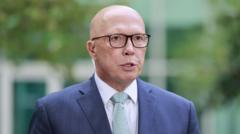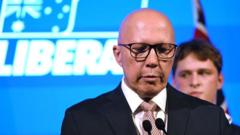In a significant shift, Peter Dutton of the Liberal-National Coalition has retracted a contentious promise to abolish work-from-home options for public servants following public outcry, signaling a potential electoral strategy overhaul.
Dutton Reverses Course on Work From Home Policies Amid Backlash

Dutton Reverses Course on Work From Home Policies Amid Backlash
Australia's Opposition Leader Nullifies Plan to End Remote Work for Public Servants
Australia's Opposition Leader, Peter Dutton, has made a notable retreat from a campaign promise to eliminate work-from-home arrangements for public servants. After facing intense criticism and backlash, Dutton publicly acknowledged the error during a press conference on Monday, stating, "We got it wrong and we have apologised for it."
Originally, the opposition coalition presented the controversial policy as part of a broader plan targeting efficiency improvements, which also included the potential cut of 41,000 public service jobs. Critics, including members of the incumbent Labor government, argued that ending remote work would disproportionately impact women and caregivers and was out of touch with current workplace realities.
In an effort to regain favor, Shadow Finance Minister Jane Hume stated that the coalition would no longer pursue changes to flexible working arrangements. "We have listened and understand that flexible work, including work from home, is part of getting the best out of any workforce," she remarked, reflecting a shift in strategy just weeks ahead of the election scheduled for May 3rd.
The Coalition's initial job cuts proposal faced scrutiny, with many calling for clarification on how these reductions would be achieved. Hume indicated that, if elected, the coalition would seek to implement the job decreases via natural attrition and hiring freezes rather than forced layoffs. However, Dutton's earlier comments hinted at a more aggressive approach, leading to further confusion within the party on its stance.
Labor government officials seized on the flip-flopping, with Employment Minister Murray Watt criticizing Dutton's inconsistent messaging, claiming it undermines his credibility as a leader. This episode highlights a growing trend where workplace flexibility is being challenged by some political figures globally, while many voters, especially in Australia, are more concerned with pressing issues such as cost-of-living.
The recent policy reversal could mark a crucial moment in the ongoing campaign, shifting the political conversation towards flexibility in the workplace as a priority for voters during this election season.


















